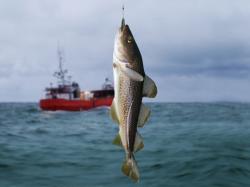NOAA Announces Interim Measures On Gulf Of Maine Cod, Emergency Measure On Haddock
November 11, 2014 | 3 min to read

WASHINGTON – NOAA Fisheries's Regional Administrator for the Greater Atlantic Region John Bullard hosted a Town Hall teleconference regarding Interim and Emergency Actions for Gulf of Maine Cod and Haddock.
Specifically, Mr. Bullard announced that the Agency would aim to reduce fishing pressure on cod through a combination of time and area closures and restrictions, limits on the amount of cod that can be caught in a given trip, and a prohibition of recreational fishing for cod. Simultaneously, the quota on the healthy Gulf of Maine haddock stock was increased from 676,000 pounds to 1.3 million pounds.
These in-season management measures were introduced in response to new scientific information regarding the status of both species, and will be in place until NOAA and New England Fishery Management Council can implement a more long-term plan in 2015. Current recommendations for the cod catch in the upcoming year would see catch levels reduced from an acceptable biological catch of 1550 metric tons to 386 metric tons.
In a statement, NOAA Fisheries explained, "We are attempting to help halt the continued decline of cod in the hopes that it may rebuild to support viable fisheries in the future. At the same time, to provide some fishing opportunity on abundant groundfish stocks in the near term, we are increasing the Gulf of Maine haddock quota."
Fishermen were invited to participate in the call and offer feedback on the measures. Audio excerpts of several of these comments are included below:
Listen to Allyson Jordan, a boat owner from Maine, express her concerns that the lobster industry is not being sufficiently regulated, despite data showing that lobster fishermen in the Gulf of Maine land substantial numbers of cod.
Listen to Jim Odlin, of Atlantic Trawlers Fishing, Inc., question an interim measure that prevents fishing vessels from fishing in more than one management area during a single fishing trip. Mr. Odlin expresses his concerns that vessels encountering cod in a particular Gulf of Maine management area will continue to do so if they are prevented from fishing elsewhere during that trip.
Listen to Jackie Odell, Executive Director of the Northeast Seafood Coalition, question how Gulf of Maine cod stocks will be assessed in the future and monitored for spawning activity. Ms. Odell believes that fisheries managers have not yet "gotten to the root of management problems."
Listen to NEFMC councilmember Ellen Goethel criticize NOAA's use of older cod spawning data in their assessment. Also featured is NOAA's Northeast Regional Administrator John Bullard in response to Ms. Goethel's comment that these regulations are "punitive to the small boat fleet."
Source: Saving Seafood
